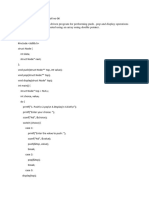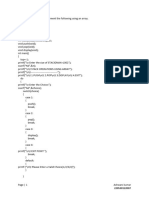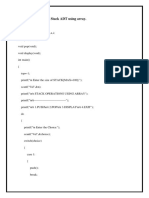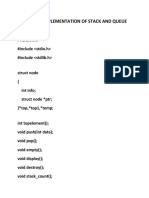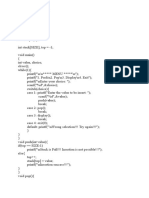0% found this document useful (0 votes)
17 views28 pagesDSP Lab
The document provides C++ implementations for Stack and Queue Abstract Data Types (ADTs) using both arrays and singly linked lists. It includes detailed code examples for initializing, pushing, popping, enqueuing, dequeuing, and displaying elements of the stack and queue. Additionally, a C program for a double-ended queue (deque) ADT using arrays is also presented.
Uploaded by
Rahul SinghCopyright
© © All Rights Reserved
We take content rights seriously. If you suspect this is your content, claim it here.
Available Formats
Download as DOCX, PDF, TXT or read online on Scribd
0% found this document useful (0 votes)
17 views28 pagesDSP Lab
The document provides C++ implementations for Stack and Queue Abstract Data Types (ADTs) using both arrays and singly linked lists. It includes detailed code examples for initializing, pushing, popping, enqueuing, dequeuing, and displaying elements of the stack and queue. Additionally, a C program for a double-ended queue (deque) ADT using arrays is also presented.
Uploaded by
Rahul SinghCopyright
© © All Rights Reserved
We take content rights seriously. If you suspect this is your content, claim it here.
Available Formats
Download as DOCX, PDF, TXT or read online on Scribd
/ 28

